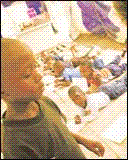
This came from South Africa as well. It's an excellent article and could be a "ditto" all over the world.
Diets for preschool children
Preschool children and toddlers have similar dietary needs to ensure adequate growth and to prevent nutritional problems such as deficiencies and obesity. However, the quantities of food that preschool children require are larger and the variety of foods they are prepared to accept is greater than in the case of toddlers.
Other factors that play a role
By the time a child reaches the age of four, he or she has become a social being. This impacts considerably on food intake. Some of the factors that can influence children in this age group are obvious, others are subtle and may not be evident to anxious caregivers who despair about the child’s dietary habits.
The following factors can exert an influence on your child’s food intake and food preferences:
a) The family environment
For preschool children the family is the primary influence, which determines what food habits the child develops. If significant role models such as a father or older brother or sister express dislikes for certain foods, then the younger children in such a family may well follow suit.
Caution the older members of the family NOT to show active dislikes of certain foods such as vegetables or fish, if you want your preschool child to learn to eat these nutritious foods.
Once again, it is important to make mealtimes pleasant and relaxed occasions so that the child can eat in peace without stress or anxiety. Don’t turn your shared meals into battle grounds and don’t humiliate your child by making her sit at the table for hours after everyone else has left, ‘to eat all the food on the plate!’. This is a recipe for disaster and will teach the child to fear mealtimes and eating.
Try to remember that children between the ages of four and six still have small stomach capacities and are physically unable to eat large quantities of food. Rather give them small portions and more frequent small meals so that they can eat the food you offer them without creating stress.
Also try to allow sufficient time for the young child to eat his food. It is not his fault that you may be in a tearing hurry to get to work. Putting pressure on children to eat fast can also cause stress and lead to frustrating eating habits. The child may start eating too fast, or even slower than his skills permit, in order to send you a message that he is not feeling happy about rushed meals. This creates a vicious cycle that will make all concerned even more uptight.
b) The influence of society
As mentioned above, preschool children are usually social beings and society can influence their food intake and likes and dislikes considerably.
Dangers of TV watching
Probably the most important external influence on a young child’s life is television. Preschool children watch an alarming amount of TV and are exposed to many advertisements linked to food and beverages. The problem is that young children are highly receptive to glamorous TV messages that are specifically designed to target children. Most of these ads are for foods low in dietary fibre and high in fat or sugar, and energy-rich cold drinks.
In addition to the ‘brain washing’ that young children are subjected to when they watch TV, there is the added danger of them turning into couch potatoes. The couch potato syndrome is one of the main causes of childhood obesity. So if you love your child and want to prevent her from developing all kinds of poor eating habits and turning into a couch potato, then limit the amount of time she spends watching TV.
It is such an easy option to have your child ‘baby-sat’ by the TV when you are busy or too tired to play games with him, but remember that by allowing him to watch unlimited TV, you are creating endless dietary problems for him and for yourself.
In a recent study conducted in the USA, physical inactivity due to excessive TV watching was one of the prime reasons for childhood obesity. So let your children play games and learn to swim and ride a bike. This way, they'll learn to be active for the rest of their lives.
c) Peer group pressure
When young children come into contact with other children of their own age, and these children have poor eating habits, it can complicate things considerably. The only way to stop your children from learning poor eating habits from their friends and at nursery school, is to teach them good habits and warn them that they are going to meet other children who will tell them that it’s ‘cool’ to have chips, sweets and cold drinks.
Help your children by explaining how to counter peer pressure by saying, “Thank you, but I don’t need chips/sweets/drink cold drinks, because they are not healthy and can make you fat! I think it’s cool to eat healthy food/drink healthy drinks”
d) Food at nursery school
Also check what your children are given at nursery school to ensure that they are getting healthy, nutritious food. If the nursery school serves too many cold drinks and sweets and not enough fresh fruit and wholewheat sandwiches with healthy fillings, then talk to the supervisor. After all, you're paying for your child’s care and such care should include healthy food and beverages. – (Dr I.V. van Heerden, registered dietician)

No comments:
Post a Comment